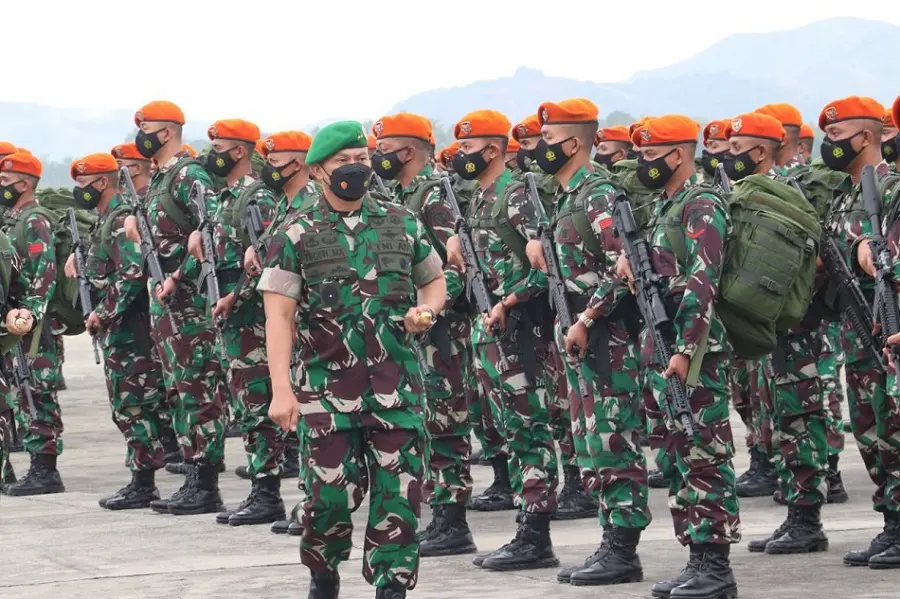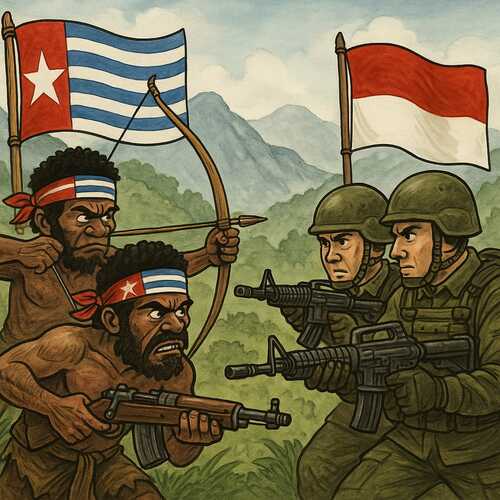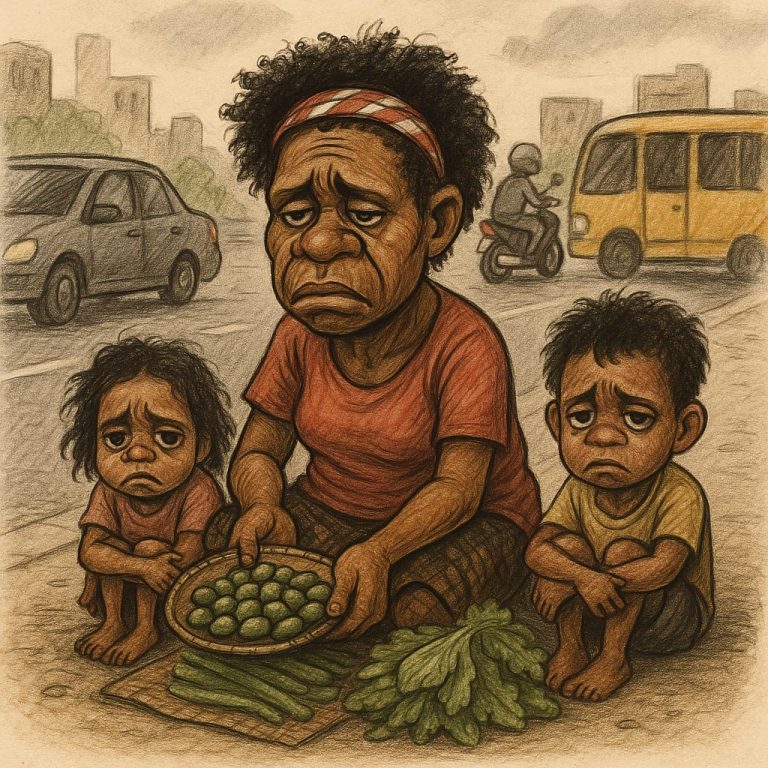
Indonesian military personnel from the Kopassus unit or Special Forces Command
Puncak Jaya, Papua – The skies over Ilaga, a highland district in Puncak Regency, Papua, looked calm on the morning of Tuesday, May 6, 2025. But on the ground, the sound of death was approaching.
Around 09:25 a.m. local time, the hum of a helicopter echoed in the distance. Within seconds, that hum turned into a violent explosion. Dust and flames shot into the air, wooden debris rained down, and the world went silent for 18-year-old Deris Kogoya.
His body was torn apart by the blast of a bomb. Deris had just completed his final year at SMP Negeri 1 Ilaga, a local junior high school. He had been spending his days waiting for the high school admission process to begin.
He was not a soldier. He was not a militant. He was just a teenager with dreams of living peacefully in the mountains of Papua.
Elsewhere in the same village, 21-year-old Jemi Alom from Yongolawi was gravely injured. He is now being treated using traditional medicine. Homes were damaged, panic swept through the village, and residents fled seeking safety, if such a place still existed.
Misfire Kills Civilians
The attack was reported by Major Numbuk Telenggen, a field commander of the West Papua National Liberation Army (WPNLA/TPNPB). In his statement to TPNPB-OPM’s Central Command, he claimed that Indonesian military airstrikes targeted their base but missed, instead hitting civilian areas.
“We are ready to fight weapon to weapon, but do not drop bombs on our villages. This is already a violation of the laws of war,” said Sebby Sambom, spokesperson for the TPNPB-OPM, in a written statement.
TPNPB’s central command later issued an open letter to Indonesian President Prabowo Subianto and the Commander of the Indonesian National Armed Forces (TNI), demanding an end to the use of heavy weaponry in the Papua conflict.
According to the group, mortars, fighter jets, and aerial bombs only add to the growing list of civilian casualties who are not party to the conflict. This was not the first time such attacks occurred.
In recent years, large-scale military operations involving attack helicopters and drones have become routine in conflict areas of Papua, particularly in the Central Highlands. But for civilians like Deris and Jemi, nothing about this war is routine.
Ilaga has long been a flashpoint in the armed struggle between the Indonesian military and police forces (TNI/Polri) and the TPNPB. Since 2021, thousands have been displaced due to escalating violence. Schools have shut down, teachers have left, and clinics no longer operate. Deris was one of the few young people who continued their education amid deteriorating conditions.
Now, his life has been stolen, not by bullets in a battlefield, but by a bomb that fell near his home. In seconds, his village was turned upside down. The Kogoya family can only mourn their son through the broken ruins of what was once their home.
Revenge and New Threats
While Ilaga mourned, threats of retaliation were rising elsewhere. On May 3, 2025, the WPNLA/TPNPB’s Yahukimo regional command (Kodap XVI) claimed responsibility for executing an Indonesian military intelligence agent who was allegedly posing as a civilian.
The execution took place at a government housing complex on Lokpon Street, Yahukimo Regency. Major Yosua Sobolim, commander of the Sisibia Battalion, declared that they would continue targeting government intelligence and military personnel, including non-Papuan migrants suspected of espionage.
“We know who these migrants are—the ones who come in pretending to be ojek drivers or merchants. If they enter a war zone, they are no longer civilians in our eyes,” he said.
His words carry a chilling message: the battlefield is no longer confined to the jungle or mountain ridges. It now extends into streets, markets, and residential neighborhoods. Civilians both indigenous Papuans and non-Papuan settlers are increasingly caught in the crossfire.
The Papua conflict is not a conventional war. It is rooted in colonial trauma, structural marginalization, and decades of unaddressed human rights abuses. The Indonesian government continues to label the TPNPB a criminal separatist group, while the TPNPB insists it is fighting for Papuan self-determination and independence.
The human toll is enormous. Reports from Human Rights Monitor and Amnesty International estimate that over 60,000 civilians have been displaced since the conflict reignited in 2018. Many are hiding in the forests with no access to food, clean water, or medical care.
International humanitarian law expert Dr. Hikmah Siregar warned that attacks on civilians may constitute serious violations of the Geneva Conventions.
“The distinction between combatants and non-combatants is a cornerstone of the laws of war. Disproportionate attacks that kill civilians could amount to war crimes,” she said.
A Dialogue That Never Arrives
To this day, no formal dialogue exists between the Indonesian government and the TPNPB. Despite occasional calls for internationally mediated negotiations, no meaningful diplomatic process has been initiated.
Jakarta continues to rely on a two-pronged approach: military force and infrastructure development. Officials claim that roads, bridges, and airports will bring prosperity and peace. But many Papuan groups argue that these projects only strengthen Jakarta’s grip over their ancestral lands.
Without dialogue and with repression as the default response, the cycle of violence continues to turn. And in this seemingly endless battlefield, there are always more young lives like Deris—waiting for a future that never arrives.
Ilaga may be quiet after the blast, but in the hearts of Papua’s mothers, children, and youth, the echoes of war have never truly stopped.
The Indonesian government maintains that military operations are necessary to eliminate armed separatist groups who routinely attack security forces and public facilities. However, no official statement has been released by the TNI or the Ministry of Defense regarding the latest incident in Ilaga.
Indonesia’s National Human Rights Commission (Komnas HAM) and several civil society organizations have urged the government to reconsider its militaristic approach. They advocate for solutions based on dialogue and acknowledgment of the conflict’s root causes, including land rights, structural discrimination, and the Papuan people’s demand for self-determination.
As tensions escalate, both national and international attention is once again drawn to this long-forgotten conflict. Observers warn that unless a meaningful diplomatic intervention takes place soon, Papua may descend further into a devastating spiral of violence. (Julian Haganah Howay)






